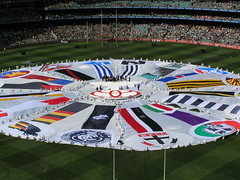The last couple of films I’ve seen happen to have been both good-natured, gentle, character-driven comedies. They’re a nice change from the recent trend towards unsubtle humour, of which recent examples are Borat or Nacho Libre.
A quirky road-movie
Although this film is fundamentally a road movie, with a journey that is more important than the destination, and characters who make self-discoveries through overcoming adversities, the plot is not what this film is about. It’s really about the characters.
The family that jumps in a car together is not defined by their disfunction (a la the Griswolds in National Lampoon’s Vacation) but by their individuality. They are an improbably diverse set of characters.
There’s the average-looking girl that dreams of winning a beauty pageant (the Little Miss Sunshine of the title), the boy that doesn’t talk, the father who’s a motivational speaker, the practical housewife, the suicidal uncle, and the drug-addicted grandfather. It’s a totally delightful mix, and each is pretty well rounded.
Don’t expect deep insight, but the bizarre characters reflect back to us the bizarre nature of parts of modern American society. I enjoyed it.
A mockumentary full of toilet-humour
The central character of this documentary-style movie is Kenny, brought to us through the skills of actor Shane Jacobson, who also edits the film and is one of the writers. The other writer, Clayton Jacobson, is also the director, and also makes an acting appearance. So does Ronald Jacobson and at least one other Jacobson. It’s very much a family show.
The show is something like a week-in-the-life of a port-a-loo plumber. We get to experience his honest perspective on the everyday activity of using the toilet, while meeting his family and colleagues. Kenny feels fully rounded and believable. I wouldn’t be surprised if this is the creation of a new Australian comic personality.
There are some fantastic lines, and many laugh-out-loud moments. It’s also a tale of family and acceptance. I hope we see Kenny again.


